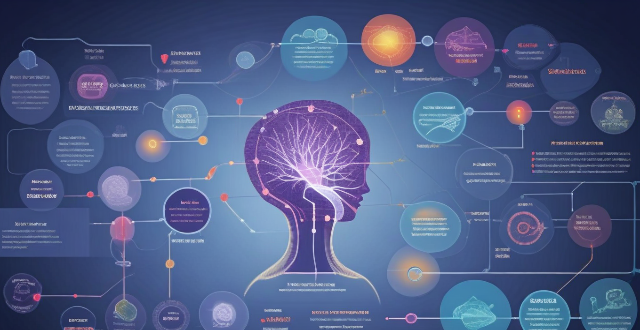Disease Health

Can using a health management app reduce the risk of chronic diseases such as diabetes or heart disease ?
Health management apps can help reduce the risk of chronic diseases by monitoring health metrics, providing insights, promoting healthy habits, and issuing reminders. However, over-reliance, inaccuracies, and privacy concerns are downsides to consider. While beneficial, these apps should not replace professional medical advice.

Does high-intensity interval training (HIIT) have specific benefits for chronic disease prevention ?
High-intensity interval training (HIIT) offers numerous benefits for chronic disease prevention, including improved cardiovascular health, enhanced glucose control, reduced inflammation, increased muscle mass and strength, and improved mental health outcomes. To incorporate HIIT into a healthy lifestyle, start slowly, choose the right exercises, include other forms of exercise, and consult with a health professional.

What are the potential health risks associated with global warming ?
Global warming, caused by human activities, poses various health risks including heat-related illnesses like heatstroke and dehydration, spread of diseases such as malaria and Lyme disease, respiratory problems including asthma and allergies, and mental health issues like anxiety, depression, and PTSD. It is crucial to take measures to mitigate these effects and safeguard public health.

How much exercise is needed per week to prevent chronic disease ?
Chronic diseases are a major cause of death and disability worldwide. Regular physical activity can help reduce the risk of developing chronic diseases such as heart disease, diabetes, and some types of cancer. According to the World Health Organization (WHO), adults should aim to do at least 150 minutes of moderate-intensity aerobic exercise or 75 minutes of vigorous-intensity aerobic exercise each week, along with muscle-strengthening activities at least twice a week. However, the amount of exercise needed to prevent chronic diseases may vary depending on individual factors such as age, sex, body weight, and overall health status. It's recommended that people try to incorporate at least 30 minutes of moderate-intensity aerobic exercise into their daily routine, along with strength training exercises whenever possible.

Can exercise reverse heart disease ?
Heart disease is a major cause of death worldwide, and it can be devastating to those affected. While there are many treatments available for heart disease, including medication and surgery, some people wonder if exercise can reverse the damage caused by heart disease. There is evidence that regular exercise can help prevent and manage heart disease by improving cardiovascular health, managing weight, lowering blood pressure, improving cholesterol levels, and reducing stress. However, there is no conclusive evidence that exercise can completely reverse heart disease. Despite this, there are still many benefits to regular exercise for heart health. If you have been diagnosed with heart disease or are at high risk for developing it, talk to your doctor about starting an exercise program. They can help you create an exercise plan that is safe and effective for your individual needs and goals.

How does adequate sleep play a role in women's health ?
Adequate sleep is vital for women's health, affecting immunity, hormone balance, weight management, mental well-being, cardiovascular health, skin condition, chronic disease prevention, and overall quality of life. Prioritizing sleep can lead to fewer sick days, better reproductive health, reduced stress, improved mood and cognitive function, lower risk of heart disease and stroke, delayed aging signs, and a higher quality of life.

What are the key challenges facing global health security today ?
Global health security faces several key challenges, including emerging infectious diseases, antimicrobial resistance, weak health systems, political instability and conflict, and social determinants of health. These challenges threaten the well-being of people worldwide and require collective efforts to prevent, detect, and respond to infectious diseases that threaten human health.

What is the importance of dental hygiene in overall health ?
The Importance of Dental Hygiene in Overall Health Dental hygiene is an essential aspect of maintaining good overall health. Poor dental hygiene can lead to a range of health problems, including gum disease, tooth decay, and bad breath. In this article, we will explore the importance of dental hygiene in overall health and provide tips for maintaining good oral health. How Dental Hygiene Affects Overall Health Gum Disease: Gum disease, also known as periodontal disease, is caused by the buildup of plaque on the teeth and gums. If left untreated, it can lead to inflammation, infection, and even tooth loss. Gum disease has been linked to several systemic health problems, including heart disease, diabetes, and respiratory disease. Tooth Decay: Tooth decay occurs when bacteria in the mouth produce acids that eat away at the enamel on the teeth. This can lead to cavities, pain, and even tooth loss if left untreated. Tooth decay can also affect overall health by causing digestive problems and nutritional deficiencies. Bad Breath: Bad breath, also known as halitosis, is often caused by poor dental hygiene. It can be embarrassing and may even affect social interactions. In some cases, chronic bad breath can be a sign of underlying health problems, such as gum disease or respiratory infections. Tips for Maintaining Good Oral Health Brush Your Teeth Twice a Day: Brushing your teeth twice a day with fluoride toothpaste helps remove plaque and bacteria from your teeth and gums. Floss Daily: Flossing daily helps remove plaque and bacteria from between your teeth where your toothbrush cannot reach. Visit Your Dentist Regularly: Regular dental checkups and cleanings can help identify and treat potential problems early on before they become more serious. Eat a Healthy Diet: Eating a healthy diet low in sugar and high in nutrients can help keep your teeth and gums healthy. Drink Water: Drinking water throughout the day helps rinse away food particles and bacteria in your mouth. Avoid Tobacco Products: Smoking or using other tobacco products can increase your risk of developing gum disease and other oral health problems. Limit Alcohol Consumption: Drinking too much alcohol can dry out your mouth and increase your risk of developing gum disease and other oral health problems.

What are the benefits of regular exercise on personal health ?
Regular exercise is crucial for maintaining good health and preventing chronic diseases. It improves cardiovascular health, aids in weight management, increases muscle strength and endurance, enhances mental health, improves sleep quality, and reduces the risk of chronic diseases. Incorporating physical activity into your daily routine can significantly improve your overall quality of life.

What are the current global health challenges ?
The world is facing a multitude of health challenges that require immediate attention and action, including infectious diseases, non-communicable diseases, mental health issues, and environmental health hazards. Infectious diseases such as COVID-19, HIV/AIDS, tuberculosis, and malaria continue to be a major threat to global health. Non-communicable diseases like cardiovascular diseases, cancer, diabetes, and chronic respiratory diseases are becoming increasingly prevalent globally. Mental health disorders, including depression, anxiety disorders, and substance abuse, are a growing concern worldwide. Environmental factors such as air pollution, water pollution, climate change, and natural disasters also pose significant risks to human health.

What are the long-term effects of air pollution on our health ?
The long-term effects of air pollution on health are wide-ranging and severe, affecting individuals and entire communities. Respiratory diseases, cardiovascular diseases, neurological disorders, reproductive health problems, and other health issues have all been linked to exposure to polluted air. It is essential to address air pollution as a public health issue to protect the health and well-being of people worldwide.

How does exercise benefit the health of older adults ?
Exercise plays a crucial role in maintaining the health and well-being of older adults. Regular physical activity can significantly improve their quality of life by preventing diseases, promoting longevity, and enhancing mental health. This text discusses the various benefits of exercise for seniors, including improvements in strength, endurance, mobility, balance, chronic disease management, stress reduction, emotional health, cognitive functioning, social interaction, independence, and overall quality of life. Engaging in regular physical activity is one of the most effective ways for seniors to maintain a healthy and fulfilling lifestyle as they age.

What role does public health play in the implementation of biosafety policies ?
Public health is crucial for implementing biosafety policies, which aim to contain and manage biological agents that may pose a risk to human health, animal health, or the environment. Public health professionals play key roles in surveillance and disease detection, risk assessment and management, laboratory biosafety, vaccination programs, public education and awareness, policy development and implementation, emergency response, and international collaboration. By monitoring disease trends, assessing risks, maintaining laboratory safety, promoting vaccination, educating the public, developing policies, responding to emergencies, and collaborating internationally, public health professionals help protect individuals and communities from biological hazards.

How does climate change influence the distribution and survival of disease-carrying organisms ?
This text discusses the influence of climate change on the distribution and survival of disease-carrying organisms, highlighting how altered habitats, changes in reproduction and life cycle, and altered behavior and transmission rates contribute to the spread of diseases. It further provides examples of specific disease-carrying organisms affected by climate change and suggests mitigation strategies such as surveillance, control measures, public health education, and research to address these challenges.

How does predictive analytics help in disease prevention and management within the healthcare system ?
Predictive analytics in healthcare can significantly improve disease prevention and management by identifying patterns and trends in patient data. It offers benefits such as early intervention, personalized treatment plans, enhanced operational efficiency, and informed decision-making. Applications include disease surveillance, chronic disease management, and patient care optimization. However, challenges like data privacy, quality, and the need for skilled data analysts must be addressed to fully realize its potential.

Can physical activity reduce the risk of heart disease ?
Regular physical activity can significantly reduce the risk of heart disease by improving blood circulation, strengthening heart muscles, and reducing major risk factors such as high blood pressure, high cholesterol, and diabetes. Recommended types of exercise include aerobic activities and strength training. Following guidelines from health organizations like the WHO can help maintain cardiovascular health.

How can sports help improve the physical health of rural residents ?
Sports and physical activities can greatly improve the physical health of rural residents by enhancing fitness levels, managing weight, promoting mental well-being, encouraging social interactions, and preventing chronic diseases. It is crucial for local authorities and organizations to promote sports programs and provide accessible facilities to encourage more rural dwellers to engage in physical activities regularly.

How does consistent physical activity affect the immune system in relation to chronic disease prevention ?
The article discusses the impact of consistent physical activity on the immune system and its role in preventing chronic diseases. It explains that regular exercise can increase the number and activity of immune cells, reduce inflammation, and improve overall health. The article also provides recommendations for exercise and emphasizes the importance of incorporating physical activity into one's lifestyle to prevent chronic diseases and improve well-being.

How do vaccines work to protect against disease ?
Vaccines protect against disease by introducing a small amount of the pathogen into the body, triggering the immune system to produce antibodies that protect against future infections with the same pathogen. There are several types of vaccines with unique mechanisms of action and effectiveness against specific pathogens. The development of vaccines is a complex process requiring extensive testing and research, but they have been shown to be highly effective at preventing serious diseases.

How does vaccine distribution affect public health ?
Vaccine distribution is crucial for global health, reducing disease incidence and healthcare costs while increasing productivity. Challenges include inequitable access, logistical complexities, and public perception issues.

Why is vaccine equity important for global health ?
Vaccine equity is crucial for global health as it ensures fair distribution of life-saving vaccines worldwide. It helps prevent disease outbreaks, reduce health inequalities, promote economic stability, and improve overall health outcomes. By ensuring everyone has access to vaccines, we can create a healthier world for all.

What is the role of the World Health Organization (WHO) in promoting global health ?
The World Health Organization (WHO) plays a crucialThe World Health Organization (WHO) plays a crucial by providing leadership, setting norm WHO's work is focused on improving health outcomes worldwide through various activities such as convening stakeholders, establishing international standards for health, generating scientific knowledge to inform policy decisions, providing technical support to countries, and monitoring global health trends.

What are some good gluten-free food options for people with celiac disease ?
Celiac disease is an autoimmune disorder that damages the small intestine and requires a strict gluten-free diet. Good gluten-free food options for people with celiac disease include fruits and vegetables, meat and fish, gluten-free grains and starches like quinoa and brown rice, dairy products, nuts and seeds, gluten-free flours and baking mixes, and gluten-free snacks and beverages like popcorn and juices.

What are the impacts of climate change on human health ?
Climate change affects human health in various ways, including increased heat-related illnesses, extreme weather events, changes in disease patterns, food and water security issues, and mental health impacts. It is important to take action to mitigate these effects and protect public health.